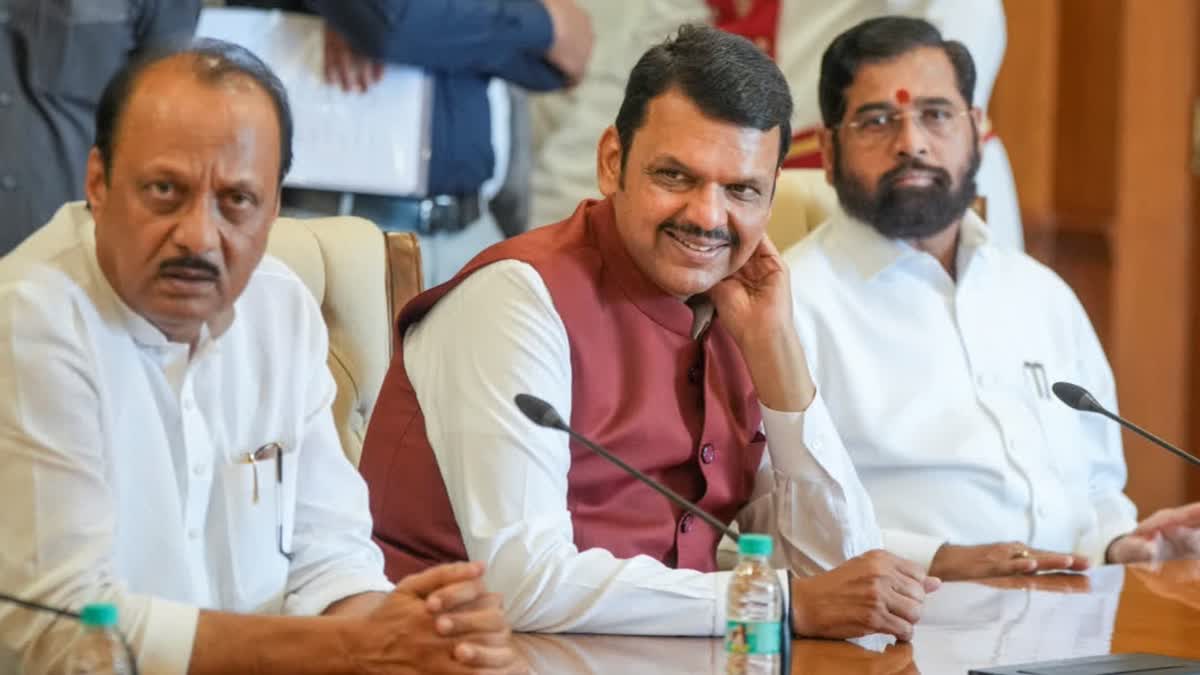Hyderabad:The Mahayuti comprising the BJP, Shiv Sena and the Nationalist Congress Party (NCP) fared poorly in the 2024 Lok Sabha polls in Maharashtra as they won only 17 out of the total 28 seats in the key western state. But within six months, the political scene changed dramatically as Mahayuti made an unbelievable and robust recovery in the run-up to the 2024 Maharashtra Assembly Elections
The then Maharashtra Deputy Chief Minister and senior BJP leader Devendra Fadnavis, now the Chief Minister, dropped a political bombshell after the Lok Sabha polls results were declared. Fadnavis, who had coined the famous slogan - 'Mi Punha Yeein' (I will come back again), took full responsibility for the LS loss and offered to resign from the post of Deputy CM post. He urged the BJP top brass to relieve him from the Deputy CM post and work for the party for the Maharashtra polls.
Cut to November 23, 2024, the Mahayuti won the Maharashtra Assembly Polls by a huge margin. It was the best show by any alliance in the history of the state as the Mahayuti won over 230 seats, with the BJP alone winning a staggering 132 seats. The BJP thus emerged as the single largest party while the Shiv Sena led by former Maharashtra CM Eknath Shinde, currently the Deputy CM, won 57 seats.
The Ajit Pawar-led NCP won 41 seats and Ajit himself who took oath as Deputy Chief Minister of Maharashtra, Ajit defeated Yugendra Pawar, grandson of Nationalist Congress Party (Sharadchandra Pawar) chief Sharad Pawar from his traditional Baramati seat.
So what changed in a matter of six months? The Mahayuti put up a united face as against the Maha Vikas Aghadi (MVA), which is also not likely to get the Leader of Opposition post in the Maharashtra Assembly.
From the first day when the Election Commission of India announced poll dates, Devendra Fadnavis was confident of a Mahayuti win. He had said that a fake narrative does not work all the time.
The Mahayuti then introduced the 'Ladki Bahin' scheme for the women, where the beneficiaries, were given a stipulated amount every month. This scheme turned out to be a game-changer as more women voted in the Assembly polls and they voted in favour of the BJP and its allies.
The other factors that proved crucial for the Mahayuti are that they restored confidence among the voters, reaching the schemes to the masses, and controlling the rebels within their alliance.
For example, in the Borivali Assembly seat in suburban Mumbai, senior BJP leader and former MP Gopal Shetty had rebelled against the party's official candidate Sanjay Upadhyay. However, top BJP leaders including Union Minister Piyush Goyal and Devendra Fadnavis, reached out to a miffed Shetty and persuaded him to take back his nomination.
Like this, the BJP was successful in containing its rebels which helped the party to consolidate its voters. Like Borivali, which is a traditional BJP bastion, the BJP managed to retain all other traditional seats like Nagpur South-West from where Fadnavis was elected, Kasba Peth from where Hemant Rasne was elected, Parvati from where Madhuri Misal won, Colaba from where Rahul Narwekar was elected, and Malabar Hill from where Mangal Prabhat Lodha won.
This Maharashtra election was a battle between the two Shiv Senas and it was the one led by Eknath Shinde that trounced the Shiv Sena (Uddhav Balasaheb Thackeray) led by Uddhav Thackeray, son of late Shiv Sena founder Balasaheb Thackeray.
Shiv Sena dominated the polls as they won 57 seats against UBT's 20 seats. The Shiv Sena did exceedingly well in urban areas of Mumbai, and Thane to a large extent in the rural areas, particularly the coastal region.
